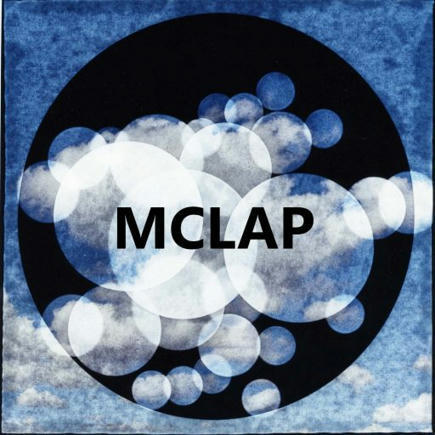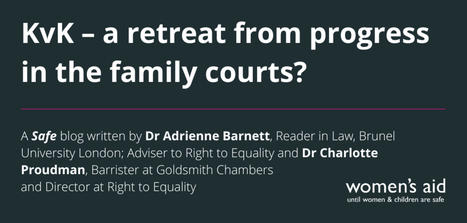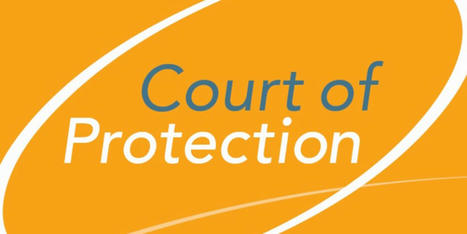The Domestic Abuse Bill became law on 29 April 2021 and is now known as the Domestic Abuse Act 2021. The Act is vast and wide ranging, and this post covers those parts of it which bear directly on the work of the family courts. There is lots more in it that we aren’t covering here. Although it is now law, not all of the sections of the Act are in force just yet. In fact, none of those we discuss in this post are in force – but they will be coming to a family court near you at some point in the near future. The Act applies mainly to England and Wales only. If you want to read the Act itself you can find it here. There are two main areas that are relevant for those interested in or involved with Family Courts : provisions about protection for victims and witnesses domestic abuse protection orders (DAPOs) We’ll deal with those in turn, and then cover a few other bits and bobs that might be useful to know about from a Family Court perspective. PROTECTION FOR VICTIMS, WITNESSES, ETC IN LEGAL PROCEEDINGS Sections 62 to 67 of the Act deal with these issues, and there are three aspects to the new laws : special measures prohibition on direct cross examination amendments to s91(14) of the Children Act 1989 Special measures Special measures in the Family Court are dealt with in section 63, and there are equivalent provisions for civil courts in section 64 (by civil courts we mean the County Court, which deals with mostly non-family work but is responsible for a few things that are connected to families). It’s important to remember that some family matters are not heard in a family court – disputes between former cohabitees about the ownership of property (known as ToLATA proceedings after the Trusts of Land and Appointment of Trustees Act) are technically civil proceedings and therefore dealt with in the County Court (though often by judges who also sit in the Family Court). It’s worth noting that as of 6 April 2021 the overriding objective in the Civil Procedure Rules (‘CPR’) (which apply to all cases in the County Court) has been amended to make it clear that ‘dealing with a case justly’ includes ensuring that the parties can participate fully, and that parties and witnesses can give their best evidence, and there is a new Practice Direction 1A which makes provision for how courts will give effect to the amended Overriding Objective in relation to vulnerable parties or witnesses. This brings the CPR broadly into line with the Family Procedure Rules (which apply to all cases in the Family Court), which already have equivalent provisions that you can read about in Jack’s post here (Although the Civil Overriding Objective is in fact more explicit on the issue of vulnerability than the one in the Family Rules). For our purposes, what all this means is that broadly the same situation applies to all family law cases, and that includes cohabitee property cases, even though they aren’t technically in the Family Court. Back to the Act : Section 64 creates a presumption where a party or witness is or is at risk of being a victim of domestic abuse from a member of their family or a witness or party in the proceedings, that the quality of their evidence and / or their participation as a party is likely to be diminished by reason of vulnerability. An exception may be made where the person who is vulnerable does not want to be treated as eligible for special measures. ‘Special measures’ are just defined as ‘such measures as may be specified by rules of court for the purpose of assisting a person to give evidence or participate in proceedings’. The Family Procedure Rules, and now the Civil Procedure Rules already cater for this (in the FPR by Rule 3A and PD3AA), so the difference is in the presumption that a victim of domestic abuse will need and be entitled to special measures, as opposed to them having to justify their eligibility. The provisions about special measures are not yet in force and a date for their commencement hasn’t yet been set. Prohibition on direct cross examination Again, there are similar provisions on this topic for Family Courts (section 65) and Civil Courts (section 66). Section 65 amends the Matrimonial and Family Proceedings Act 1984 (‘MFPA 1984’, the Act which was amended in 2014 to create and define the powers of the Family Court), adding new sections 31Q and onwards. The wording of these sections has been around for a number of years, because there have been attempts to pass them via various bills over several Parliaments. Those new sections will mean that where : a party has been convicted, cautioned or is charged with a ‘specified offence’, or is the subject of an on-notice protective injunction, or where ‘specified evidence’ is adduced that a party has carried out domestic abuse then there is a ban on the (alleged) victim and (alleged) perpetrator cross examining one another (there are some exceptions for spent offences). If for some reason the court hasn’t realised there is a conviction / protective injunction and allows the cross examination to go ahead this doesn’t make any decision null and void as a result. The Act tells us that ‘specified evidence’ will be defined in regulations. Those regulations haven’t been made yet so we don’t know exactly what will be required. It’s worth noting that the trigger for the ban is that the evidence is ‘adduced’. The evidence does not have to be tested or accepted as valid for the prohibition to kick in – so we can anticipate that the ‘specified evidence’ is probably going to have to come from a source or otherwise be likely to have some degree of reliability (for example to come from a specified professional and / or based on contemporaneous records or medical examination). The Act tells us that ‘specified offence’ will be defined in regulations. Those regulations haven’t been made yet, but based on drafts circulating in previous Parliaments it is likely they will include violent offences, sexual offences, offences of domestic abuse / coercive control and possibly harassment and / or breaches of domestic abuse protective orders (it would probably be possible to check back through Hansard to see if there is any further detail available about the intended list of specified offences but that would have been very time consuming). In addition to the automatic prohibitions, which the judge has no say in, there is a catch all provision in what will be section 31U of the MFPA 1984, which gives the court a power to prohibit a party from cross-examining even if none of the above applies but where it appears to the court that either : the quality of evidence given by the witness is likely to be diminished if the cross-examination is conducted by the party in person, and it would be likely to be improved if the prohibition was imposed; OR the cross-examination by one party in person would be likely to cause significant distress to the witness or another party and that distress is likely to be more significant than if the cross examination were conducted some other way. This last ‘more significant’ requirement is to filter out cases where the cause of the distress is unconnected to the identity of the person asking questions. The court can exercise its power under section 31U to make a discretionary prohibition order either because it has been asked to do so, or because the judge has decided herself that it would be appropriate even though nobody has asked. Before making a decision the judge has to consider the views of the witness / proposed questioning party; the nature of the questions likely to be asked, having regard to the issues in the case; any behaviour findings in these or other proceedings against either the witness or proposed questioning party; any behaviour by the party at any stage of the case, both generally and in relation to the witness / party; and any relationship (of whatever nature) between the witness and the party. In addition, the judge can make a direction if it would not be ‘contrary to the interests of justice’ to do so – that means that the judge can’t make a prohibition direction if overall it would make things unfair in some other way. The court can change its mind on the request of a party part way through, but it has to give reasons if it does so. The power under this section might be used in cases of domestic abuse that for some reason don’t quite fit in the mandatory sections, but it could also capture cases where a party or witness is vulnerable for some other reason, for example because they are particularly emotionally fragile due to a mental health difficulty and would manage cross examination by a neutral professional much better than from their ex partner. So what happens when there is a prohibition in place? How does cross examination happen? A good question. This is dealt with in what will be section 31W MFPA 1984 ‘Alternatives to Cross Examination’. There is a staged process : The court must consider whether (ignoring this section) there is a satisfactory alternative means for the witness to be cross-examined or of obtaining evidence that the witness might have given under cross-examination in the proceedings. If the court decides that there isn’t, the court must invite the prohibited party to arrange for a qualified legal representative to act for them for the purpose of cross-examining the witness, and set a date by which they must notify the court of whether they have done so. If at the end of that period the court has been notified there is no qualified legal representative appointed or there has been no notification and it appears to the court that no qualified legal representative is to act for this purpose the court must consider whether it is necessary in the interests of justice for the witness to be cross-examined by a qualified legal representative appointed by the court to represent the interests of the party. If the court decides that it is, the court must appoint a qualified legal representative (chosen by the court) to cross-examine the witness in the interests of the party. Where the court appoints a lawyer then the lawyer is not responsible to the party. Their role is limited to cross examining, rather than advice or full representation throughout the hearing. Lawyers will be overjoyed to hear that the Lord Chancellor is in charge of fixing the rates of payment for this work and for issuing guidance to lawyers about their role in such cases. The fees will be paid from ‘central funds’ rather than legal aid. Once again, these provisions are not yet in force and a date has not yet been set. It remains to be seen how well these new arrangements work in practice. It is probably not ideal for a party to have a lawyer swoop in and ask questions of their choosing, probably with no mechanism in place for them to take instructions or properly understand the case put by the ‘client’, beyond reading their witness statement. It may well make for less effective cross examination, does not enable a party to direct the advocate as to the points s/he wishes to be put (albeit this is always a matter for the judgment of the advocate, the party has even less input here), and it does not offer full protection to a vulnerable witness or party because the party cannot be prohibited from causing distress at other points in the trial through their submissions (either by the content and tone of them or the sound of their voice) or their behaviour, although other special measures might mitigate some of those difficulties. Moreover, it is quite likely that the rates of pay and ethically compromising position an advocate under this scheme would be placed under will make this work quite unattractive to lawyers. It is quite possible that the rates of pay will mean that the cab rank rule does not apply. For all those reasons, there might be difficulties securing advocates of sufficient experience and expertise to carry out this work. There remain some real question marks about how much of a fair trial this will afford to either party. On all these points only time will tell. Amendments to s91(14) of the Children Act 1989 (‘Barring orders’) S91(14) of the Children Act 1989 is the piece of law which, in appropriate cases, allows the court to say ‘enough’ and to prevent a parent coming back to court to make further applications without first obtaining permission from the court to do so. These are often informally known as ‘barring orders’, although they aren’t in fact a complete bar to another application. s91(14) is typically – but not always – used where there have been repeated vexatious or unmeritorious applications or protracted proceedings. You can read a bit more about the existing case law on s91(14) via the judgment linked in this post by Julie Doughty and in Re P (an old but still applicable case which gave guidance on s91(14)). Section 67 of the Domestic Abuse Act 2021 will amend section 91(14) so that where the court is satisfied that the making of an application would put the child or another ‘relevant individual’ (the victim of domestic abuse) at risk of harm it may make a s91(14) order. That clearly now empowers the court to make such an order even if there has not been a history of vexatious, unmeritorious applications or protracted proceedings. Although this was always possible under the case law, s91(14) orders have very often been the subject of successful appeals, so this clarity will empower and embolden victims or childrens’ guardians to make such applications, and will give judges confidence that if they do so they are within the law. The Act also amends s91(14) so that where a parent makes an application for permission whilst a s91(14) order is in force, the court must consider whether there has been a material change of circumstances since the order was made when it decides whether to grant leave or not. That means that applications which do not demonstrate a material change in circumstances are more likely to be summarily disposed of by the court, without the respondent (in this scenario probably the victim of domestic abuse) being troubled by it. That is a slightly different approach to the one set out in Re P, which described the test on an application for leave as follows : “On an application for leave, the applicant must persuade the judge that he has an arguable case with some chance of success. That is not a formidable hurdle to surmount. If the application is hopeless and refused the other parties and the child will have been protected from unnecessary involvement in the proposed proceedings and unwarranted investigations into the present circumstances of the child.” It was put slightly differently in (Re A (Application for Leave) [1998] 1 FLR 1, CA, where the Court of Appeal said ‘The application should demonstrate there is a need for renewed judicial investigation’. Arguably, it was always the case that to satisfy the test in Re P, a parent was probably going to have to show some change in circumstances anyway, but this makes it explicit. The amendments also make clear that a s91(14) order can be applied for by a party, the child’s representatives or can be made by the court even if nobody has applied. One of the common reasons for this sort of order being appealed, often successfully, is a failure to ensure a fair process by giving advance warning that the making of such an order is under consideration – even though judges can make an order without an application from one of the parties, they will still need to ensure a fair process, because a s91(14) order is an interference with the Article 6 (fair trial) and the right o access to court, and Article 8 (family life) rights of the party affected by it. The amendments relating to s91(14) are not yet in force and no date has been specified. So for the time being s91(14) remains unchanged. DOMESTIC ABUSE PROTECTION ORDERS Sections 22-46 of the Act deal with new Domestic Abuse Notices and Domestic Abuse Protection Orders. These are a little bit like a hybrid of two sorts of orders that are already available, with a few bells and whistles that neither provide. Under the existing law, police officers can issue Domestic Violence Notices and can present a case to the Magistrates Court to secure a Domestic Violence Protection Order. The Domestic Abuse Notice / Orders will operate in a similar way – the police can issue a notice, can go to the Magistrates and effectively drive the protection of vulnerable victims of abuse without placing the responsibility on them, and hopefully giving them space to think about their options and make a break. Where the new DAPO scheme differs from the existing DVPO scheme (apart from the name) is that a DAPO can last indefinitely rather than the current maximum of 28 days for a DVPO, a suspected breach of a notice or order is arrestable (the officer just needs reasonable grounds to believe there is a breach and does not need a warrant), a breach of a DAPO will be a criminal offence, punishable by a maximum sentence of 5 years in prison. These last two reflect the current position in the case of the other sort of existing order : non-molestation orders, which are available from the Family Court. The DAPO scheme also operates across courts – as well as police being able to take the lead on a victim’s behalf, a victim who is already involved in family (or relevant civil) proceedings with the perpetrator can seek a DAPO through the Family Court. Alternatively, a Family (or civil) judge who is already dealing with a case between the parties can make an order of their own motion. So, these will be a flexible new tool for Family Courts to use. The court can make a DAPO where on balance of probabilities (more likely than not) it finds that there has been ‘abusive’ behaviour, the parties are ‘personally connected’ and it is ‘necessary and proportionate to protect the victim from domestic abuse, or the risk of domestic abuse’. That is similar to the requirements for a non-molestation order, and there are provisions for things the court must consider (such as the welfare of any relevant child) which are also very similar to the Family Law Act 1996, which deals with non-molestation orders. What is different to non-molestation orders and DVPOs is that the court can impose a mandatory requirement – i.e. it can order a person to actively do something, rather than just telling them they must not do something (typically: must not come to the house, must not contact, must not use or threaten violence). In particular, it can tell them they must attend a course, or must wear an electronic tag (we will need to wait and see whether or not a mechanism is found for the family court to exercise this power – its typically only something ordered in the criminal courts, so it might turn out that if this is required an application is best made in the Magistrates court – but again, we’ll have to wait and see). It’s worth noting that these powers apply only to ‘relevant’ civil proceedings, and those will be defined by regulations – that might mean that the powers are limited in practice to cases where the parties are current or former cohabitants or where the subject matter of the case is connected to family breakdown e.g. ToLATA proceedings – but we don’t yet know. What is curious about this new framework is that although the Domestic Abuse Act 2021 will repeal the old DVPO scheme, it doesn’t repeal those parts of Part IV Family Law Act 1996 which deal with non-molestation orders, even though the DAPO will do everything a non-molestation order could do and more. This leaves a slightly weird situation where there are two parallel choices available to those who seek protection from the Family Court – it’s possible that there will need to be some changes to legal aid to fund DAPO applications, but who knows whether the amendments will be to make funding available for both types of application, or will switch funding to DAPOs and remove it for non-molestation orders – or vice versa! In trying to unpick this conundrum we’ve come across this Factsheet produced during the passage of the Bill. It tells us that: “The Bill will repeal existing Domestic Violence Protection Orders. Other protective orders, such as Non-Molestation Orders and Restraining Orders, will remain in place so that they can continue to be used in cases which are not domestic abuse-related, such as cases of stalking or harassment where the perpetrator is not a current or former intimate partner or a family member.” This is confusing, because non-molestation orders are only available in cases where the perpetrator and victim are ‘associated persons’ which broadly equates to them being a current or former intimate partner or family member. We can’t really work out when a DAPO would be unavailable but a non-molestation order would be. We don’t entirely understand the distinction between cases of stalking and harassment and domestic abuse cases because stalking and harassment is often part of domestic abuse or takes place post-separation in a domestic abuse case. But in those cases where there is stalking or harassment between people who are not ‘associated persons’, the correct and only remedy would be an injunction under the Protection from Harassment Act 1997 – so again, keeping non-molestation orders doesn’t seem to obviously add anything and leaving them in place seems to somewhat undermine the intention stated in the factsheet that ‘DAPOs will become the ‘go to’ protective order in cases of domestic abuse’. However, the factsheet promises that ‘Statutory guidance on the orders will cover how DAPOs fit within the existing protective order landscape and scenarios in which they should be considered’ so no doubt all will become clear in due course. These provisions are – yes you’ve guessed it – not yet in force, and we don’t have a date for their commencement yet. Incidentally, we notice that there is another new piece of Scottish legislation just out, called the Domestic Abuse (Protection) (Scotland) Act 2021 which looks as if it may contain similar or equivalent provisions for Scotland, but that is beyond the scope of this blog which only addresses the position in England & Wales. MISCELLANEOUS POINTS Section 80 of the Act also introduces a prohibition on medical professionals charging a fee to provide evidence of domestic abuse, which is often a problem for those who need such evidence in order to obtain legal aid. Section 57 imposes a duty on local authorities to publish a strategy in relation to services for the victims of domestic abuse and their children. This is not directly relevant to family courts, but may be a useful document for parents’ lawyers to refer to in public law proceedings where domestic abuse has been a feature and a carer or potential carer remains vulnerable and in need of support. It may enable legal representatives and other professionals to identify and access appropriate services, perhaps of relevance in potential removal cases or at final hearing when the court is carrying out an ‘holistic analysis’ of the realistic options for children in light of the support and services which are available to them. Section 83 requires the Secretary of State to publish a report about the extent to which individuals, when they are using contact centres in England, are protected from the risk of domestic abuse or, in the case of children, other harm. That provision isn’t going to have any immediate effect since the deadline for publishing that report is 29 April 2023. UPDATES AND CLARIFICATIONS We’ve not followed all the twists and turns of the Bill as it has gone through Parliament and it’s not been practical for us to trawl Hansard for answers to some of the queries we’ve raised that might be lurking there. It may be that those who have will know some of the answers – if we are provided with any clarification, or if any becomes available through regulations or statutory guidance we will either update this post or publish a fresh one. We have a small favour to ask! The Transparency Project is a registered charity in England & Wales run largely by volunteers who also have full-time jobs. We’re working hard to secure extra funding so that we can keep making family justice clearer for all who use the court and work within it. We’d be really grateful if you were able to help us by making a small one-off (or regular!) donation through our Just Giving page. Thanks for reading! Feature pic : Big Ben Flickr by Graeme Tozer Creative Commons – thank you.

|
Scooped by
Jacqui Gilliatt
onto Legal In General May 10, 2021 2:22 AM
|
No comment yet.
Sign up to comment





 Your new post is loading...
Your new post is loading...


























